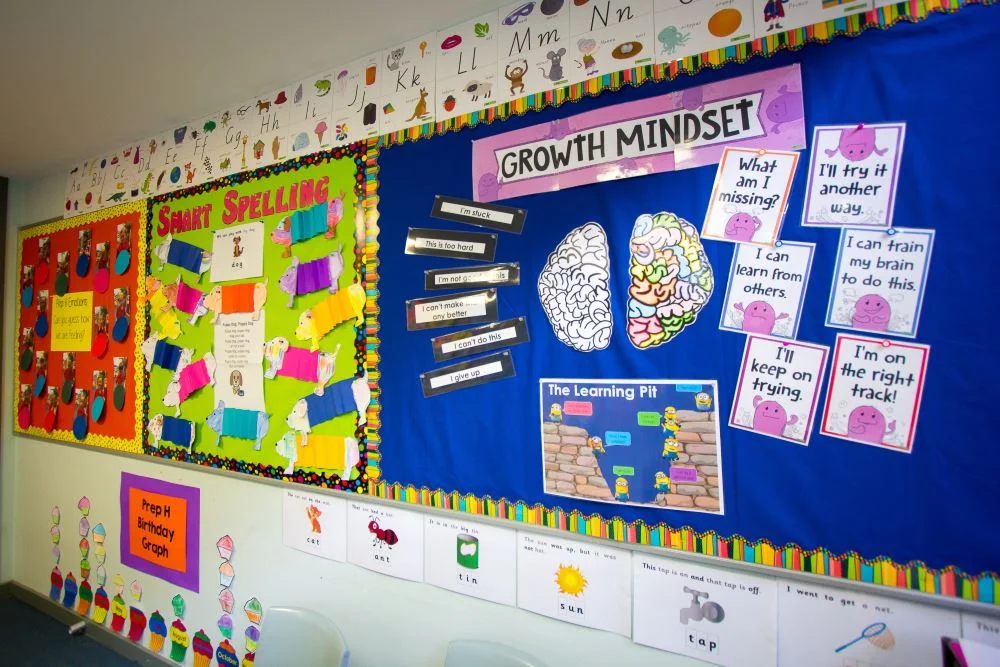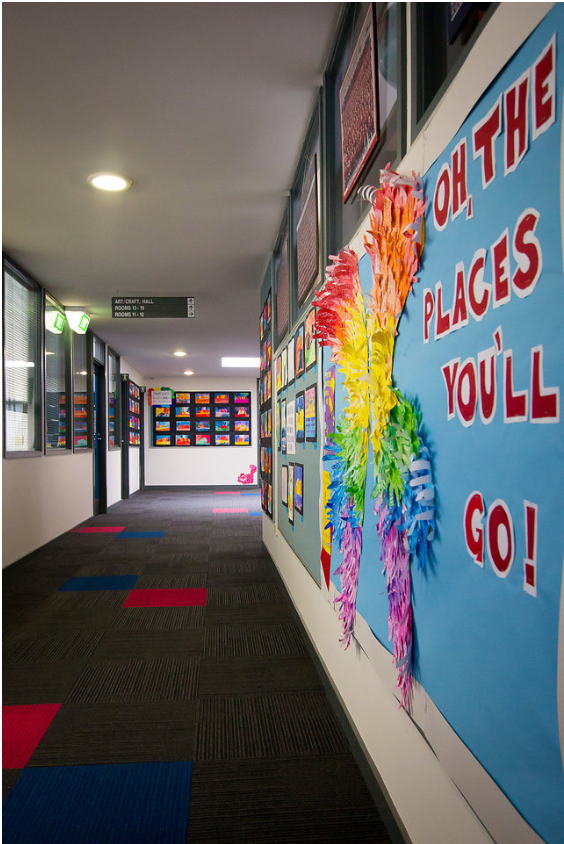The Lysterfield Approach to Learning
"Excellence is never an accident. It is always the result of high intention, sincere effort, and intelligent execution: it represents the wise choice of many alternatives—choice, not chance, determines your destiny." – Aristotle
At Lysterfield Primary School, we believe that excellence in education is not left to chance. It is the result of deliberate choices—rooted in evidence-based practices, explicit instruction, and a commitment to continuous improvement.
We use the Science of Learning to shape a rigorous and consistent curriculum. Drawing from cognitive psychology, neuroscience, and educational research, we ensure that our teaching methods align with how the brain learns best. Our structured, explicit instruction model provides clarity, responsiveness, and purpose, ensuring that students build strong foundations in literacy and numeracy.
How we design learning
Our approach is guided by key principles:
· Activating existing knowledge
· Managing cognitive load
· Emphasising practise, review, and retrieval
· Regularly checking for understanding
· Providing effective feedback
· Fostering mastery and knowledge application
To maximise student success, we implement engagement norms that promote active participation, collaboration, and deep thinking. This structured environment ensures that every student has the opportunity to engage meaningfully with their learning.
A Culture of High Expectations
At Lysterfield Primary School, our commitment to excellence extends beyond academics. Through The Pegasus Way, we create positive, secure learning environments where students feel supported to take on challenges, think critically, and persist in their efforts. Our Learner Profile traits—Collaborate, Create, Think, Reflect, Persist, Work Independently, and Accept Challenges—equip students with the mindset and skills needed to thrive.
A Whole-School Commitment
Our teachers work collaboratively to plan, resource, and evaluate their programs, ensuring consistency and reducing variation across classrooms. This shared approach strengthens professional capacity and guarantees that all students receive high-quality instruction.
Our explicit and systematic instructional model is designed to ensure that all students leave primary school literate, numerate, and better equipped to make intentional choices that shape their future. Excellence is not an accident—it is a result of the choices we make every day.
Curriculum Design – Knowledge Rich
At Lysterfield Primary School, we aim to develop students who are curious about the world around them and both confident and creative in the application of their knowledge and skills. In a rapidly evolving world, we view the attainment of knowledge as pivotal to their future success. To achieve this, the school provides sequential and targeted teaching and learning programs.
At LPS we are committed to offering a thorough, sequential and comprehensive curriculum for our students based on the Victorian Curriculum 2.0. The Victorian Curriculum 2.0 is designed as a continuum of learning that is specifically focussed on individual student learning growth. All students have access to a curriculum program that comprehensively addresses the standards and capabilities of the Victorian Curriculum 2.0.
At LPS, our commitment to key learning areas includes daily explicit instruction, review and application in English and Mathematics. We place a strong emphasis on literacy and numeracy, as we believe this is an essential pathway to success.
Core Knowledge learning exposes students to rich knowledge and vocabulary and ensures students are actively engaged in their own learning.
Our Knowledge Rich lessons are ‘KNOWLEDGE RICH AND INSTRUCTIONALLY BULLETPROOF’. The key features of our Core Knowledge learning are:
Developing student expertise through Explicit Direct Instructional techniques
The modelling and facilitation of text comprehension and analysis
Explicit vocabulary instruction
Building depth and breadth of content/knowledge
Embedding of history, geography, and civics knowledge and skills
Explicitly linking to writing instruction
The acquisition of knowledge is key in helping students make sense of the world around them and involve themselves in the learning process. Children learn best when they experience explicit teaching, ask questions, review learning, create new knowledge, discuss their discoveries and solutions and reflect on new learning.
With this as our premise, staff design learning units based on the whole school scope and sequence, ensuring there is a progression of learning connections throughout their schooling and across subject areas.
Our students complete multiple Core Knowledge units per year that address the science, health and humanities learning areas of the curriculum. These include Science, Health, History, Geography, Civics & Citizenship, and Economics & Business. We also incorporate the capabilities of the Victorian Curriculum into the design of these learning opportunities: Critical and Creative Thinking, Ethical, Intercultural and Personal and Social.
These units are implemented across the whole school, with a clear progression of knowledge. We believe the key to the application of knowledge and skills, is the explicit teaching of them.
English
At Lysterfield Primary School, we are committed to delivering the English curriculum using evidence-based approaches. Our goal is to foster a love of reading and writing while building strong foundational literacy skills. We aim for our students to first "learn to read" in Prep to Year 2, so they can then "read to learn" from Years 3 to 6, ultimately becoming skilled readers, writers, and presenters.
Word Work
We use PhOrMeS to systematically and explicitly teach word reading and spelling. PhOrMeS helps students analyse word structures, enhancing their spelling abilities and understanding of word meanings. Students from Prep to Year 6 engage in daily Word Work, exploring the phonetic and morphological aspects of words, as well as their origins (etymology).
PhOrMeS focuses on:
- Phonology (sound-letter relationships)
- Orthography (spelling patterns)
- Morphology (parts of meaning)
- Etymology (word origins)
- Semantics (whole-word meanings)
Reading
Our Reading curriculum is grounded in the Science of Reading, incorporating models such as Scarborough’s Reading Rope and the Simple View of Reading.
In Prep to Year 2, we emphasise the "Big Six": oral language, phonological awareness, phonics, vocabulary, fluency, and comprehension. Reading accuracy and fluency are promoted through the use of our Systematic Synthetic Phonics approach, alongside explicit teaching of accuracy strategies that are applied to decodable texts. Language comprehension is enhanced through rich literature, thoughtful questioning, and targeted teaching of comprehension strategies.
As students progress to Years 3 to 6, the focus shifts to expanding their background knowledge through literature units. Our teachers use high-quality literature and multisensory teaching techniques to increase students’ understanding of vocabulary and language, build their background knowledge about topics, learn expectations of genres, and practise using comprehension strategies. As students acquire more knowledge, their ability to comprehend text, understand new concepts and develop related skills improves.
Each student at LPS is allocated a Reading Goal that aligns to our developmental curriculum sequences. Each day our students participate either in a Strategy Group with their teacher, to learn a new skill or concept, or practise their goal. Our teachers administer ongoing assessments throughout the year to identify areas of mastery and areas of growth for each child.
Writing
Our Writing program aims to develop fluent and confident writers. We base our Writing program on the Hochman Method, a systematic and explicit approach, to help students recognise and construct clear and complex sentences, then progress to writing paragraphs and from there composition writing. By focusing initially on fundamental skills at the sentence level and advancing to composition writing, students learn to produce well-structured and organised writing that effectively communicates their ideas.
Speaking and Listening
At LPS, students have many varied opportunities to speak and listen to others throughout the day. This includes instructional routines such as ‘Turn and Talks’, reflective activities such as ‘Author’s Chair’, and participation in class discussions. In Grades 3 to 6, students participate in Literature studies where they learn communication skills related to active listening, respectful disagreement, elaboration, and keeping conversations engaging. In the Senior School, students engage in ‘Speech Club,’ where they prepare and deliver speeches for various purposes and practise attentive listening.
Maths
Lysterfield Primary School teaches Mathematics in line with the Victorian Curriculum F-10. The curriculum is comprised of three strands – Number & Algebra, Measurement & Geometry, and Statistics & Probability, as well as four proficiencies – Understanding, Fluency, Reasoning and Problem Solving. Students have every opportunity to learn and develop their potential, and teachers are committed to explicitly teaching Mathematics every day.
Mathematics lessons at LPS follow a structure that includes mathematical routines or ‘Hooks’ that promote whole class mathematical discussion and reasoning, and encourages students to see Mathematics as a flexible subject. Students are invited to prove, justify and make conjectures during Hooks, as well as experience multiple exposures to learnt skills as a way to support retrieval practise.
Number & Algebra is a key focus each week and students are taught skills and strategies at their point of need. For every unit of work, students complete a pre-assessment, which supports both students and teachers to ascertain an appropriate individual learning goal for each student. Students from Grades 3-6 are explicitly taught data literacy so they can make informed choices and have student voice in choosing their own learning goals based on their data.
After a learning goal has been set, students receive explicit teaching about their learning goal in small groups with the teacher, learn various ways to practise and work towards achieving that goal, and once achieved, work on the next goal in the sequence. All students across the school move through a developmental sequence of learning goals which ensures every student is being taught at their individual point of need, and learning progress is made clear, visible and achievable for each and every student.
Students also regularly engage in open-ended, problem-solving lessons. These rich tasks with a low floor and high ceiling, allow students to access the problem at their point of need. Strategies to develop problem-solving skills are explicitly taught and students work collaboratively to solve complex problems that require novel and critical thinking.
Mathematics learning is enhanced through Mathematical Investigations which see the explicit teaching and then investigation of the applied Mathematics strands Measurement & Geometry and Statistics & Probability. The Investigations allow students to see the use of Mathematics in real life, apply their skills in realistic and authentic ways, and learn the organisational skills of planning and maintaining an ongoing project.
Lysterfield Primary School is also proud to run the LPS Maths Masters Program. This program seeks to build fluency and automaticity with number concepts and number facts in our students. By increasing fluency, cognitive bandwidth is released to attend to more complex problem solving and critical thinking tasks. Through LPS Maths Masters, students practise a series of skills in short sessions across the week. When fluent in a group of skills, students receive a coloured belt award in recognition of their achievements. This whole school program consists of 9 coloured belts, so students practise skills at their point of need, and always have a belt they are striving to achieve – that is until they achieve Black Belt and become an LPS Maths Master!













